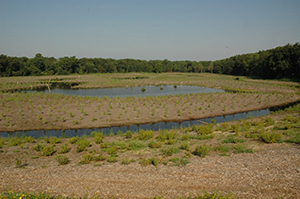Awards
Exemplary Ecosystem Initiatives — 2012
Maryland: Lizard Hill Wetland Creation

Figure 1. The Lizard Hill Wetland Creation Project is a 20-acre wetland restoration project.
Source: James Hade, State Highway Administration
Maryland's Lizard Hill Wetland Creation Project is a 20-acre wetland restoration project aimed at establishing a sand seepage habitat for a threatened tree species, the Atlantic white cedar, and improving water quality through the filtration of stormwater runoff to benefit the St. Martins River. With support from multiple Federal and State resource agencies, including the U.S. Fish and Wildlife Service, U.S. Army Corps of Engineers, Maryland Department of Natural Resources, Maryland Coastal Bays Program, and the Maryland Department of the Environment, the Maryland State Highway Administration completed the project in November 2011.
The Lizard Hill Wetland Creation Project provides a protected habitat for the Atlantic white cedar, a coastally-restricted, evergreen, wetland tree listed as Globally Threatened by The Nature Conservancy. The cedar requires a very specific set of environmental conditions to thrive, including sandy seepage wetlands. The Lizard Hill site possesses the qualities necessary to replicate the cedar's natural habitat, as the forest gradient in this area resembles the outer coastal plain of eastern North America that no longer exists along much of the Delaware, Maryland, and Virginia coasts. The successful implementation of this habitat allows for the establishment of a strong environmental network that has the potential to support other rare, threatened, or endangered species.
The total drainage to the Lizard Hill wetland site is about 13.6 square miles, encompassing agricultural land and State highways in both Maryland and Delaware. These highways, constructed prior to stormwater quality regulations, regularly contribute untreated stormwater runoff, sediment, and pollutant loads to local waterways, including the St. Martins River. Developing 20 acres of Atlantic white cedar wetlands in this area will help to deliver water quality treatment methods to this runoff, including natural filtration and biological uptake processes provided by the wetland vegetation. Improved water quality will also provide better conditions for fish and benthos (organisms living on the bottom of freshwater bodies of water) living in the St. Martins River and other local waterways. The new wetlands established by the Lizard Hill Wetland Creation Project will provide valuable environmental support by reducing the speed of stormwater runoff from the adjacent roadways, limiting the amount of sediment entering nearby creeks and ponds, and developing a suitable environment for the Atlantic white cedar to thrive.
For more information, contact Sonal Sanghavi, Maryland State Highway Administration, at ssanghavi@sha.state.md.us.

